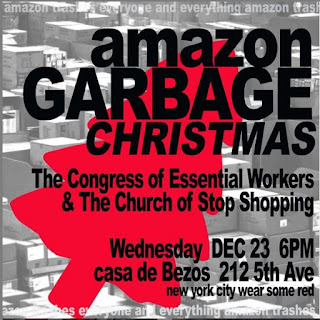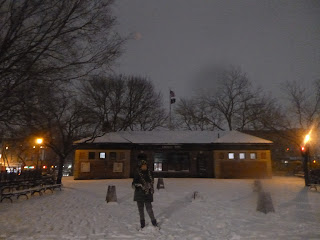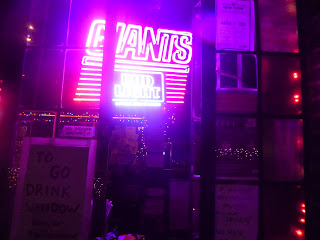These days, I spend a lot of time thinking about friendships, past and present, Paul and John in the Beatles, Fred and Deslauiers in Sentimental Education, Karl and Fred in the critique of capital, and many of my own.
I’ve always been a Paul fan.
For some, such a statement is a confession of vacuousness; for others its a step away from false binaries. It doesn’t mean I don’t love John.
I always have.
“Instant
Kharma” and “I Am Walrus” are seminal songs of my life.
But Paul wrote, "Blackbird" and "Give Ireland back to the Irish" about civil rights at home and abroad, in an homage to freedom of bodies and minds, rejecting racial and colonial shackles.
I still listen to Paul and "Hey Jude", even his new music.
Its still comforting and
occasionally moving.
No doubt, the schmaltz is always there.
But his body of work is still growing, all these years later.
And in it, there’s a story of music as a poetry and social change, across lives and cohorts.
In the Jim Crow days, they refused to play in segregated venues.
The early shows in 1964 were some of the first integrated performances in the US South.
I spent the days before the holidays listening to Paul croon on about silly love songs, friendship an loss, grading the piles of papers:
“Yeah, tomorrow may rain, so
I'll follow the sun…” Paul sang in 1964.
Its not quite, Bella Ciao, but this is song of parting.
"And now the time has come
And so, my love, I must go
And though I lose a friend
In the end, you will know
...
I'll follow the sun…”
Paul's best words and music came with the help of his collaborator John, toning down his worst instincts, reminding us we can all follow the sun, we all can.
And together they were stronger, writing about each other, sympathizing with their pain, inviting the audience to sing along to the chorus of "Hey Jude" on the David Frost show in early September 1968; there everyone saw the "sort of possibilities of community that the band, at its best, signified to the world outside."
Friendships move through time, with collaboration, conflict, resolution, and sometimes splitting.
The two songwriters grew up together, making sense of a post-war world, family dislocation, and connection. They fought, talked, made music, became famous, and the partnership ended.
In the years to follow the dissolution of the Beatles, they talked and they didn't talk, free love flourished and dissipated, and rapprochement followed by the end of the 1970's.
The conversation continued until Lennon's death.
And years later, Paul could look back on all the messy, violence and raunchiness of growing up with John:
The tensions around friendship fill bookshelf after bookshelf.
In book group, we've been reading Sentimental Education.
Themes of friendship and revolution course throughout the tome.
“Frederick invoked the right of resistance; and,
remembering a few phrases Deslauriers had used in conversation with him, he cited
the … Bill of Rights and Article 2 of the Constitution of 1791…."
The two friends had been quarreling throughout those days, but they both grew together.
"On hearing the lawyer’s name, Frederick was seized with a keen desire to see him again. He was intellectually isolated …
And Deslauiers to had felt a gap in his life ever since
their quarrel, He responded promptly to Frederic’s friendly advances. The two of them embraced and then started
talking about unimportant matters….” (p.
241).
Reading this, I find myself thinking about the Ditchdigger, wondering how his travels are going, out West, questions in the air of December.
My students’ papers are rolling in, trauma informed practice paper after paper, story after story, many on childhood abuse and neglect; some seem particularly autobiographical.
One said goodbye after years of classes together, calling it a bittersweet moment.
She wrote a small note.
Another says,
"It seems like each time we think 2020 cannot get any worse, another event occurs and proves us wrong. These last four years felt like a never ending episode of the show You got Punk’d."
The virus left inequalities exposed, many of us thinking about class struggle, now and then, 1848 revolutions, the "spectre is haunting europe..." back to 2020, pandemic raging, death rates rising, inequality expanding.
Before the holidays, the teenager and I walked through the snow to get tested in
Red Hook.
The skies had opened up the night before, leaving the neighborhood white.
A dozen tests later, we're still negative.
Snow in the ground, as we walk home.
A friend has worked in the hospital for months.
Its wearing on him.
Its wearing on us.
Not much of a senior year for the teenager.
The freshman is coping with her first year at a new
school online.
But they are not living in an attic, like Anne did, I
say to my friends in the park the night before.
Even locked up in Nazi occupied Holland, Anne believed:
"in spite of everything, that people are truly good at heart."
She still found a way to see the wonder, to see the beauty.
We all try to, even within the struggle.
On Sunday, friends from Italy to California are talking about the-last-years-of-karl-marx in book talk on zoom.
Ron and Victor are there, all of us chatting about Marx and Balzac
"Marx was famously combative," I say in one of
the final questions.
"Did he ever fight with Engels? If so, how did that go? Are there accounts of conflicts that upset him?"
Bob Ware says they seemed to be very close, worked together. But he acknowledges Engels was hurt when Marx didn’t send condolences when his partner died. There might have been more to say when they were in the pub. Engels almost broke with Marx over his writing partner always asking for money, without sending condolences.
Marcello added:
People grow in the world.
It’s the development of the individual over the course of
a life, not just the young or older Marx.
They also fight over money and prestige, orthodoxy and
ethics, sex and romance.
Its all there in Sentimental Education, the subject of our reading group, tracing the stories of revolutionaries and friendships of Paris of the 1840's, trying to find a model for a revolution.
Flaubert was not the only writer who took inspiration in this epoch, especially as the revolution turns inward, with liberation replaced by dictatorship.
In "The Eighteenth Brumaire of Louis Bonaparte" Written: December 1851-March 1852, Marx sees a pattern:
Finishing book group, Virginia sends an email, inviting us to walk to the park.
"Dear friends who live sort of near the park
and/or love Unsilent Night and might travel:
"Unsilent Night is a four-part,
45-minute boombox symphony... on every sweater and long underwear you
own, gather with people holding your portable speaker, we all push Play at the
same time, then walk together. It usually goes from Washington
Square Park to Tompkins Square Park and it's like caroling, in that people
outside are pleasantly surprised by this gorgeous, shimmering music walking by. But
pandemic, so I propose we do the walk within dark, snowy Prospect Park. Walking
six feet apart will probably make the piece sound even more mysterious and
beautiful. Let's meet at Grand Army Plaza at quarter of 6.
Please forward to Brooklyn friends. And bundle up! "
The park is eerie and quiet, a few kids out sledding in the snow, as we used to do with our kids, before their interests moved elsewhere.
Finishing grading, I join Billy and Savitri and the Church of Stop Shopping on Wednesday.
We'd been walking all afternoon, past Tompkins Square Park where a ragged guitarist plays a firebomb symphony, channeling his inner Townsend, destroying a ukulele, jamming on reverb, the crowd cheering along.
Up to Union Square we walk to:
"Protest of Amazon and its
multi-billionaire CEO Jeff Bezos
































































































ive been thinking alot about friendship, the pandemic drew the circle in a little closer, required more communciation, and it became clear some could do that "better" than others, i've always been able to be friends with the saltiest, craziest and most unpleasant people, i jsut don't care about personality that much -- and so its made my life more interesting but also more painful, because those people hurt you more, faster and their knives might be very sharp or very dull, both will fuck you up! but anyway i have to go to bed, this is an interesting topic.... your a good friend Ben! to so many of us, and now over so long....savitri
ReplyDeletei love it savitri... this is my next book. lots to talk about. big love to you rad.
Delete